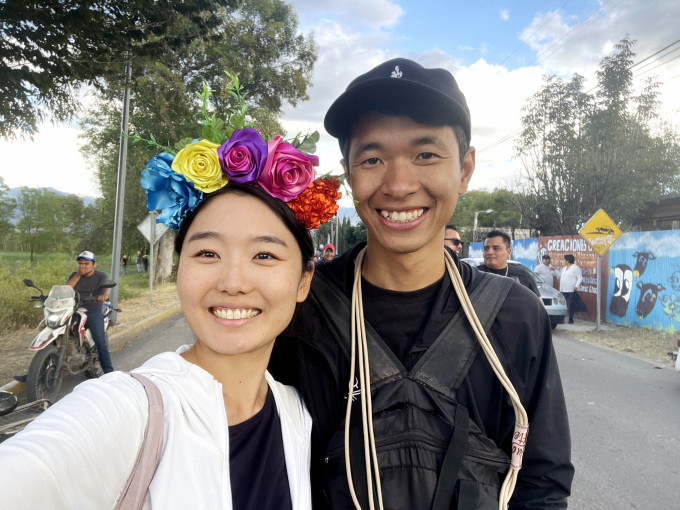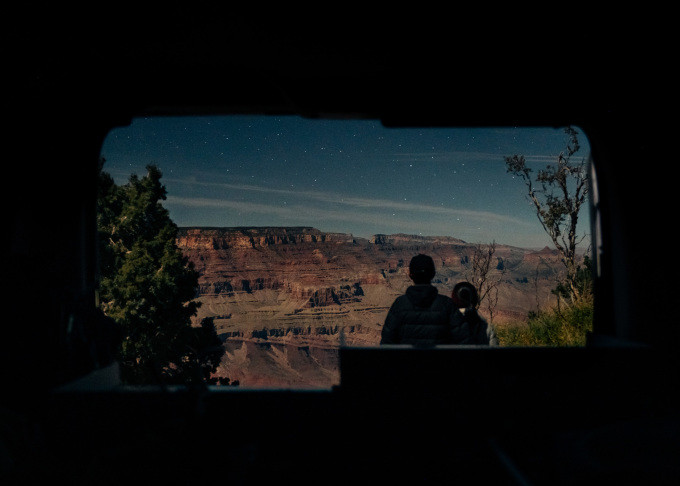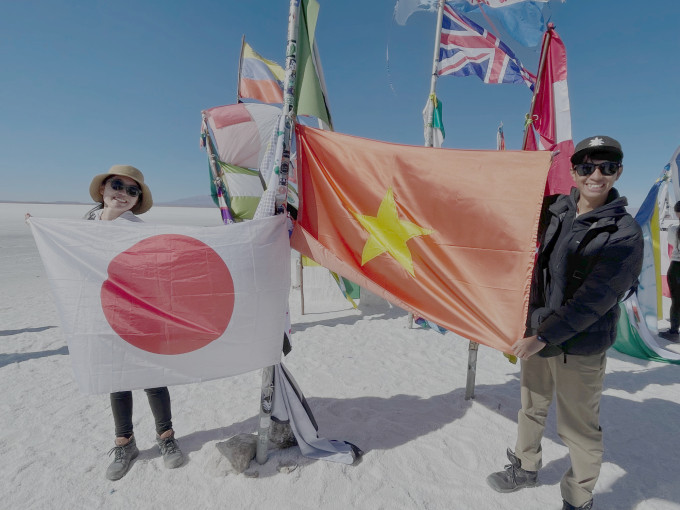"Waking up in a far away place" is the experience of Mr. Dung and his wife Chiaki for nearly a year.

In early May, Mr. Ngo Quang Dung and his Japanese wife walked on dirt roads in Madagascar, an African country known as one of the wildest lands in the world.
Life in some villages here is quite simple, houses are built of earth, people mainly walk, cook with wood, in the afternoon the children herd buffalo and goats from the fields and then jump into the river to bathe.
"Chiaki was quite surprised, especially when I told her that life in old Vietnam was exactly like what is happening here," said Dung, 28, an IT engineer.
The boy from Son Tay, Hanoi met Chiaki Hatori through an English club in his first year at Tokyo University of Agriculture in 2014. Their college love remained strong through three years of long-distance love when Chiaki studied abroad in France and graduated from different majors. In October 2021, when the Covid-19 pandemic was under control, the couple returned to Vietnam to get married.
Two days after the wedding, Chiaki contracted Covid-19. Around midnight, she suddenly became pale, her hands and feet were cold, and she had difficulty breathing like a dying person. Her family rushed her to the emergency room that night. With oxygen, she gradually regained normal breathing, but for the next three days, it was still difficult to sit up. After half a month of Chiaki's recovery, the two returned to Japan to work.
After this incident, Dung and his wife realized that "death is sometimes very close to them". They thought that if they had health problems, they would not be able to travel freely to see the world in the future, or if they were too absorbed in work, they would regret their youth. "We are still young now, not burdened with children, I want to go out to learn more about Japan and Vietnam", said Chiaki, a business consultant, and her husband supported her.
The two spent several months preparing for the trip, making sure their absences would not affect their colleagues. They only applied for US visas in advance, listed the countries they wanted to visit and the places they planned to visit in those countries, but did not make a detailed schedule.
"We have been working for 4-5 years, we save money so we have enough money to take a year off work and travel without worrying," Dung said.
In late July 2023, the couple embarked on what they called “Tsubakurame,” a journey that represents the migration of lucky swallows in Japanese culture. They spent the first four months traveling through the United States, Mexico, Colombia, Bolivia, Peru, Chile, and Brazil, before returning to the United States to rent a car and tour 23 national parks.
They then returned to Japan to apply for a visa and celebrate Tet with their families, before flying to the Philippines for nearly a month to learn scuba diving. On the 28th of Tet, they flew back home to celebrate Tet. After three weeks in Vietnam, they packed their bags and flew to Sri Lanka, India, Georgia, Türkiye and are now in Madagascar.
Over the next three months, the couple plans to visit several more African countries before completing their year-long journey.

Quang Dung has a passion for photography and filming. He has won several awards, so wherever he goes, he likes to see animals and plants. Chiaki is passionate about learning about culture, history and people. At each destination, they will find places for both to experience according to their interests.
Dung recounted that once, he and his wife spent two days in a small village deep in the Bolivian Andes, surrounded by two peaks, the Condoriri, which is over 5,600 meters high, and the Huayna Potosi, which is over 6,000 meters high, creating a terrain and flora and fauna completely different from Chiaki’s East Asian country or Dung’s Southeast Asian country. In all directions, there were vast stretches of grasslands that withered in the dry season, and occasionally, herds of lamas and alpacas (camelids) leisurely grazing.
"We often go mountain climbing in Japan, but we have never been to a place like this where there is no phone signal, TV, wifi, and electricity only lasts for two hours at night. Being disconnected from the world gives us moments of being completely alone with each other, the earth and the sky," Dung said.
Another time, the couple went into the Amazon jungle in Brazil. They were quickly overwhelmed by the greatness of the Amazon, even the drone could only see one branch of the river. "When taking a boat to the main branch of the Amazon, it was like being in the middle of the ocean without waves, really feeling small and being swallowed up," Dung said.
For Chiaki Hatori, the most memorable experience in the past 9 months was the three weeks of celebrating Tet in Vietnam, when she was able to wrap and boil banh chung herself; arrange the tray of offerings and display five fruits on the family altar. Having a fondness for sticky rice, she was able to "handle" quite a lot of banh chung for her parents. She also enjoyed the feeling of going to wish them a happy new year and watching fireworks, which made Tet warm and bustling, completely different from the quiet New Year's transition in Japan.
The daughter-in-law also realized that Vietnamese family values are more important than Japanese. Her husband always prioritizes family over career. Every time there is a national football match or a melody of the homeland and family, she realizes that the love and pride of the Vietnamese people surges.
"Since this trip, Chiaki often actively interacts with her parents in family groups, something she says is rare among young Japanese people today.
The couple using two different passports created awkward situations. There were times when they booked a ticket to a country, only to cancel at the last minute because Dung did not meet their requirements.
What they felt lucky about was that during the journey, when one was sick, the other took care of them. "Many times when I had a fever, food poisoning, had to go to the hospital or stay in a rented room, I didn't have to worry about anything because he would be the one to buy food, medicine, and stay up to watch me sleep," Chiaki shared.
Quang Dung likes being able to talk to his wife about everything in life, from the smallest to the biggest things. They are companions who can share with each other and shoulder everything together.

Dung and Chiaki said they are not interested in luxury goods, houses, or cars. They use their money to buy a year of youth to broaden their horizons and have wonderful experiences. After this time, Dung will return to work at his old company. Chiaki plans to find a new job so she can use her French and, moreover, she finds that French companies have a better work-life balance than Japanese companies.
"This journey inspired us to live differently, to spend more time together. No matter what happens, my husband and I can hold hands and watch the sunrise and sunset every day," the Japanese wife shared.
TB (according to VnExpress)